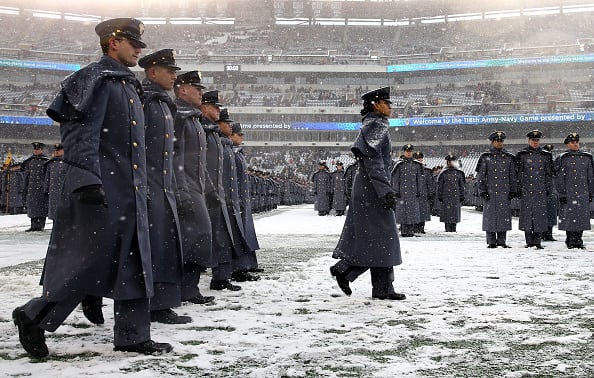A West Point senior and freshman converged unexpectedly at a spot on campus at just the right time for a man clinging to life.
And what they did next brought them the recent attention, and commendation, from Secretary of the Army Ryan McCarthy.
On October 19, Cadet Zachary Aloma was leaving his garrison commander’s office and decided to take a historic trail he’d never walked in his three years at the U.S. Military Academy.
That decision led him to arrive at the Beat Navy House shortly after 4 p.m.
Which was when Cadet Hudson Durfield was on his way to meet his family members halfway to where they’d planned to go, Trophy Point.
RELATED

The halfway mark put Durfield at the Beat Navy House just as Aloma was arriving.
Aloma moved toward the man just as Durfield entered the scene, his eyes at first on his mother and brother across the way, who he hadn’t seen since he arrived at West Point earlier this fall.
But the collapsed man caught his eye and he rushed to his side.
“It felt like providence in the right place at the right time,” Durfield said in an Army release.
Aloma checked the man’s pulse and began chest compressions, also ensuring his airway stayed clear.
Both cadets had been trained in Army lifesaving techniques. But Durfield had extra experience from his high school job as a lifeguard and Aloma had taken an emergency water safety class last year.
“It just becomes a checklist in your head. It doesn’t feel anything different (from training),” Aloma said. “You’re just going through the same motions, the same checklist.”
Though it seemed like time slowed, they both would later find out the entire episode lasted perhaps five minutes.
“It was a huge relief; I called my family right away,” Durfield said. “That was definitely a different element that my family was right there the whole time. It was just kind of another layer to the complexity of it all. That was outstanding to get that, and I called them right away and was able to sleep well at night. It was great. It was a great feeling.”
Just as paramedics arrived, the pair lost the man’s pulse. But using a defibrillator, the emergency workers brought it back. He was stabilized and moved to a local hospital.
“Fate put me in the right place, but there’s nothing special about me that made my response any different from what I think any other cadet would have done,” Aloma said. “I think all of them would have done the same thing.”
But the head of the Army thought it was special enough.
McCarthy presented both cadets with the Army Commendation Medal in a Nov. 8 ceremony, according to the release.
While at West Point, McCarthy also spoke to an entire cadet class of seniors about resiliency.
That speech followed campus tragedy — three weeks earlier a third-year cadet who’d gone missing was found dead of an apparent self-inflicted gunshot wound following a massive search of the 6,000-acre campus.
“If you are hurting, we are here,” McCarthy said. He also told cadets to share their own ideas about combatting suicide.
And he reassured them that everyone struggles and fails, but that doesn’t have to define a person.
“We are all vulnerable to feelings of shame and grief. No institution — not even this one — can be inoculated against the threat of suicide,” he said.
The secretary shared his own struggles as a second-year student at the Virginia Military Institute when he was sent home to Chicago where he lived with his parents and worked a warehouse job for a time.
But he overcame that failure, returned to school to graduate, later earning a graduate degree as well and serving in combat in the 75th Ranger Regiment.
“My catastrophic failure in college forged my grit, which would ultimately be tested in the crucible of combat,” McCarthy said.
Though he left military service in 2002, he returned to government work following the 2005 combat death in Fallujah, Iraq of his college roommate, Marine Capt. James Edge.
“I was there when he proposed to his wife, and I was there when they laid him to rest in Arlington National Cemetery,” McCarthy said. “Grief, like failure, is a powerful emotion,” he told the cadets. “It can break you down or feed your resolve.”
Todd South has written about crime, courts, government and the military for multiple publications since 2004 and was named a 2014 Pulitzer finalist for a co-written project on witness intimidation. Todd is a Marine veteran of the Iraq War.





